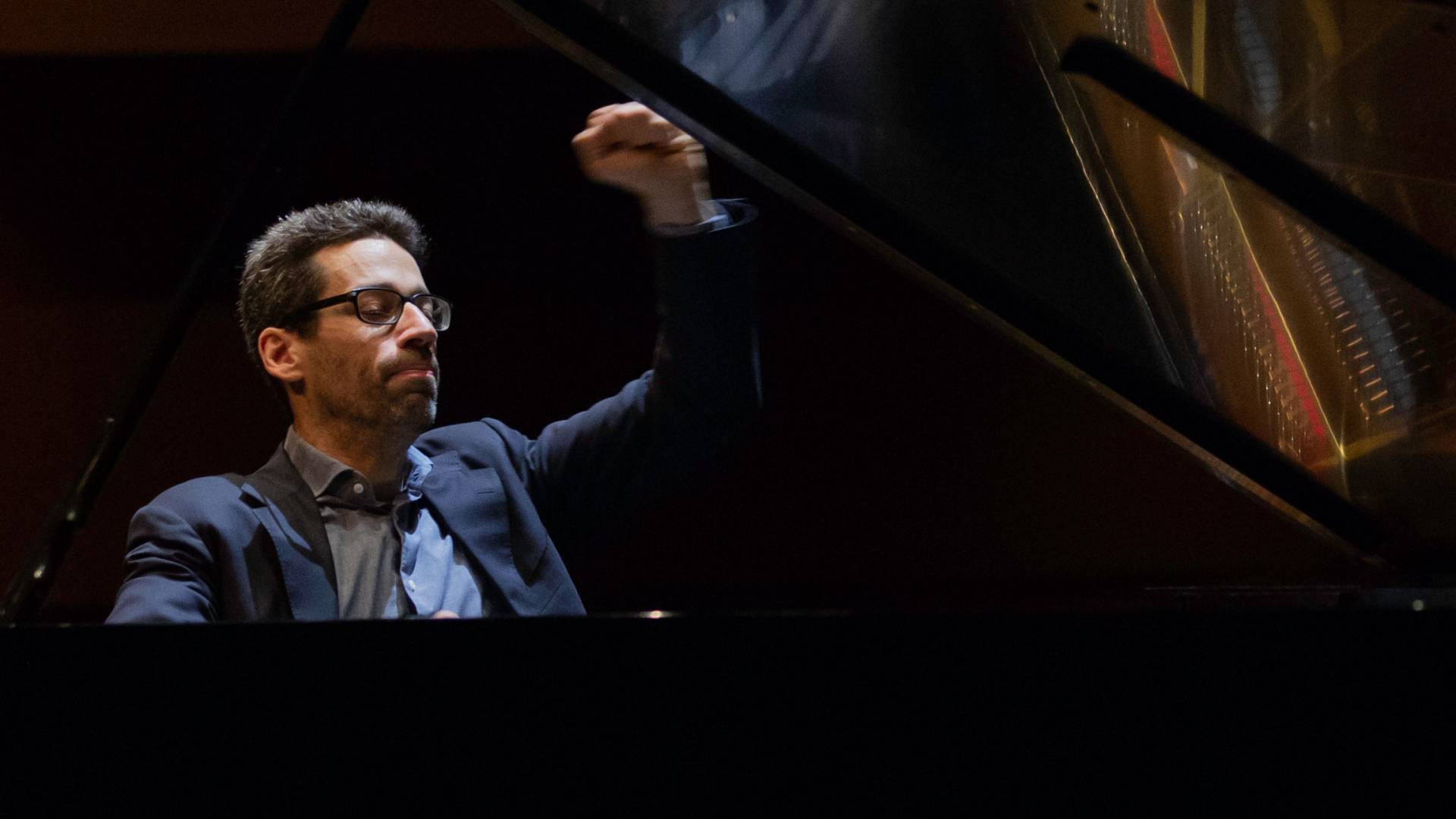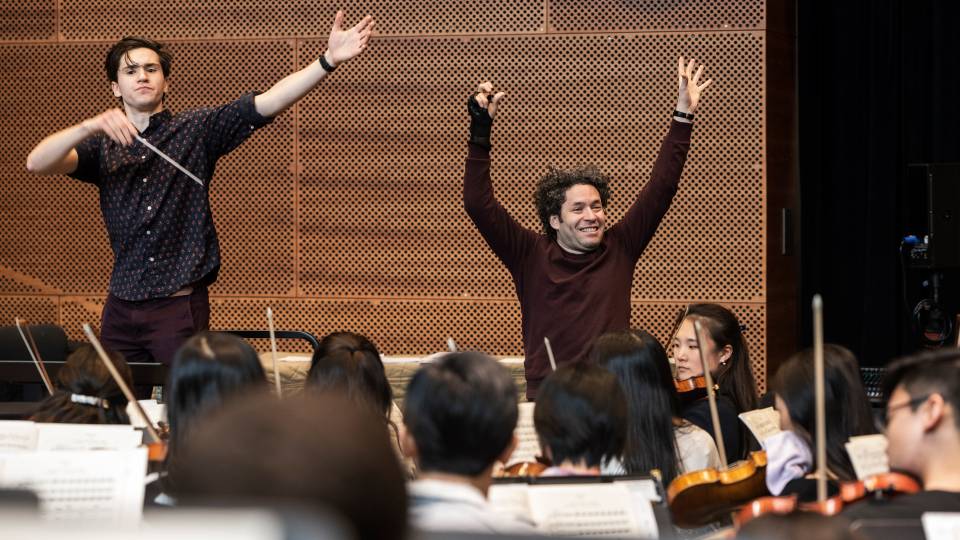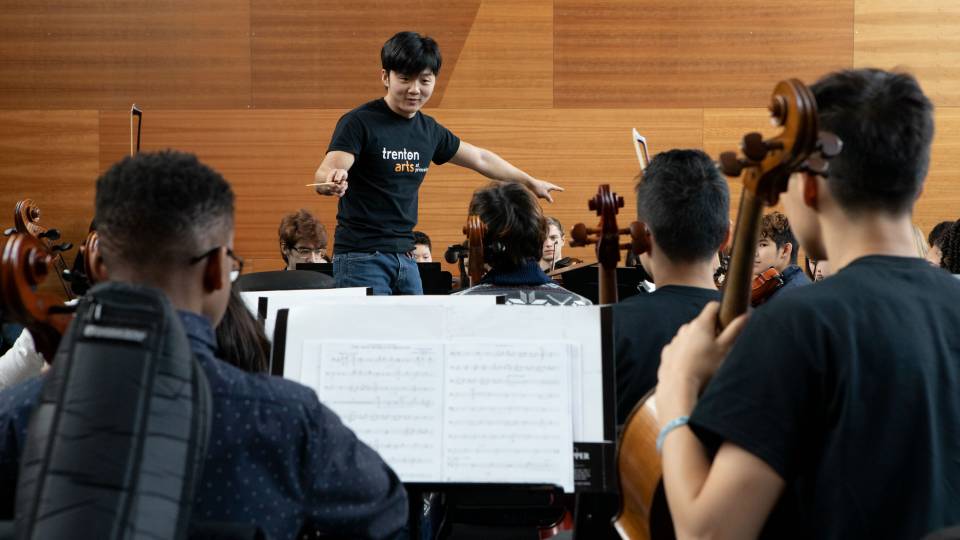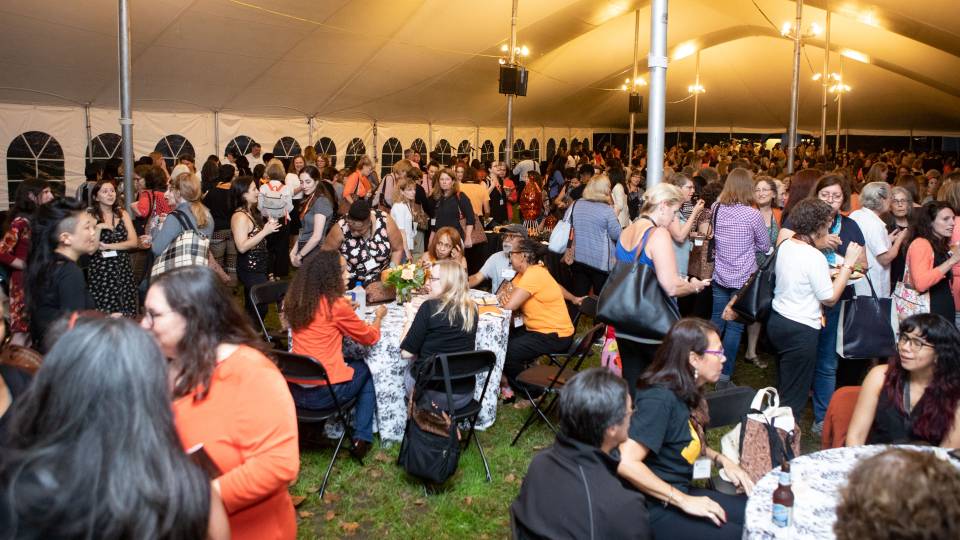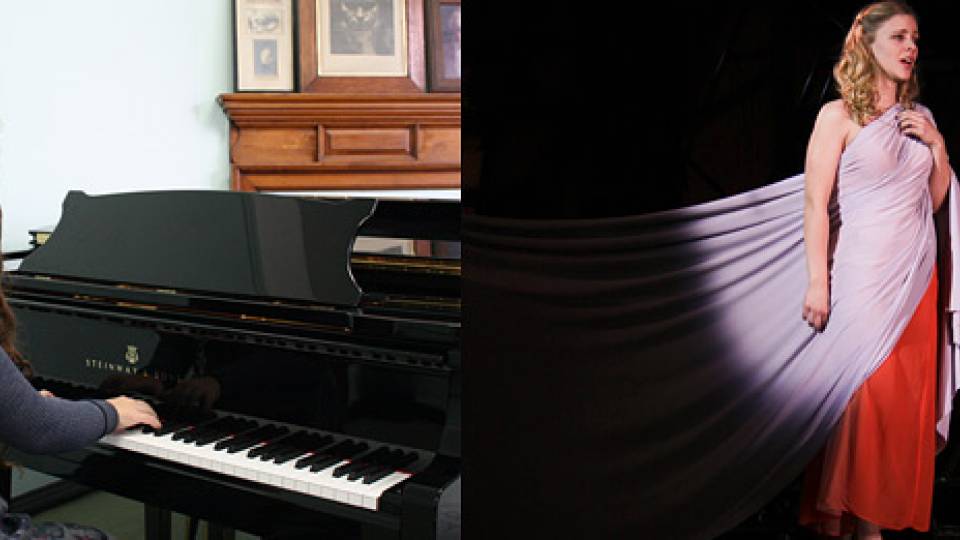Pianist Jonathan Biss is the next featured performer in Princeton University Concerts’ Healing with Music series.
After completing a recording of Beethoven’s 32 piano sonatas — an intensive, demanding project that took 10 years and was released in 2021 — the internationally renowned pianist Jonathan Biss followed up with the release of his audiobook memoir, “Unquiet: My Life with Beethoven(Link is external) (Link opens in new window),” about his struggles with crippling anxiety and the effects of his performing career on his mental health.
Biss made his New York Philharmonic debut performing Beethoven at age 21. He is now 43. In “Unquiet,” he plumbs the depths of how Beethoven — and music, in general — both contributed to and helped him heal from his anxiety.
“When I was 21, I wouldn’t have had the vocabulary to say, ’I have an issue with anxiety,’” Biss said. “I thought, maybe that’s just a natural part of being a performer. I learned to turn off my feelings and power through, which was a very bad thing to learn.”
These feelings intensified over years, Biss said. “I guess you would call it imposter syndrome — feeling like I didn’t belong in the places I was finding myself.”
On April 24 at 7:30 p.m., Biss will take the stage in Richardson Auditorium for a Princeton University Concerts(Link is external) event, “Anxiety, Depression and Music(Link is external),” part of PUC’s innovative Healing with Music series.

Adam Haslett, author of the novel “Imagine Me Gone,” joins Biss online April 10 and in person at Princeton April 24.
He will perform works by Schubert and Schumann and will be in conversation with author Adam Haslett, who will read excerpts from his 2016 novel, “Imagine Me Gone,” about a family shaped by intergenerational mental illness. As a prelude to the event, Biss and Haslett will lead a virtual discussion about their books at 7 p.m. on April 10, co-presented with the Princeton Public Library (online registration required(Link is external)).
Bliss, who was on campus last week to perform with pianist Mitsuko Uchida at Richardson as part of PUC’s Concert Classics series, said he is looking forward to the Healing with Music event as an opportunity to talk about his struggles with anxiety — which he recognizes are felt by so many people, including Princeton students, who are about the age he was at his New York Philharmonic debut.
“In those days, I thought, wrongly, the way to perform at the best level possible was to not allow those feelings in,” Biss said. “Then, because I spent so many years suppressing them, they became really uncontrollable.”
In 2019, during a performance in Schenectady, New York, he had a full-blown panic attack on stage and could not finish the performance. “I couldn’t rely on my body to make it through the concert,” he said. “I did literally collapse. I regret to say, it was the fact that it was impossible to hide that made me deal with it.”
When “Unquiet” was released, Biss said he felt an unburdening and relief. He was also flabbergasted by the volume of people who wrote to him. “People who I knew well and had never been able or willing to say that they also suffered from anxiety, as well as total strangers. Anxiety is a very lonely experience. To find that, in fact, it’s shared, to some extent, probably by everyone, was revelatory,” he said.
Healing with Music
Marna Seltzer, the artistic and administrative director of PUC, said the idea for a series that would explore personal stories and music had begun to percolate before the pandemic and felt more urgent after it, as live performances resumed.
“We realized that while people were thrilled to be back in the concert hall, for us to go back to business as usual felt almost irresponsible,” she said. “We knew that there was an incredible amount of resonance between healing and music, and we knew everyone was collectively healing from what had just happened.”
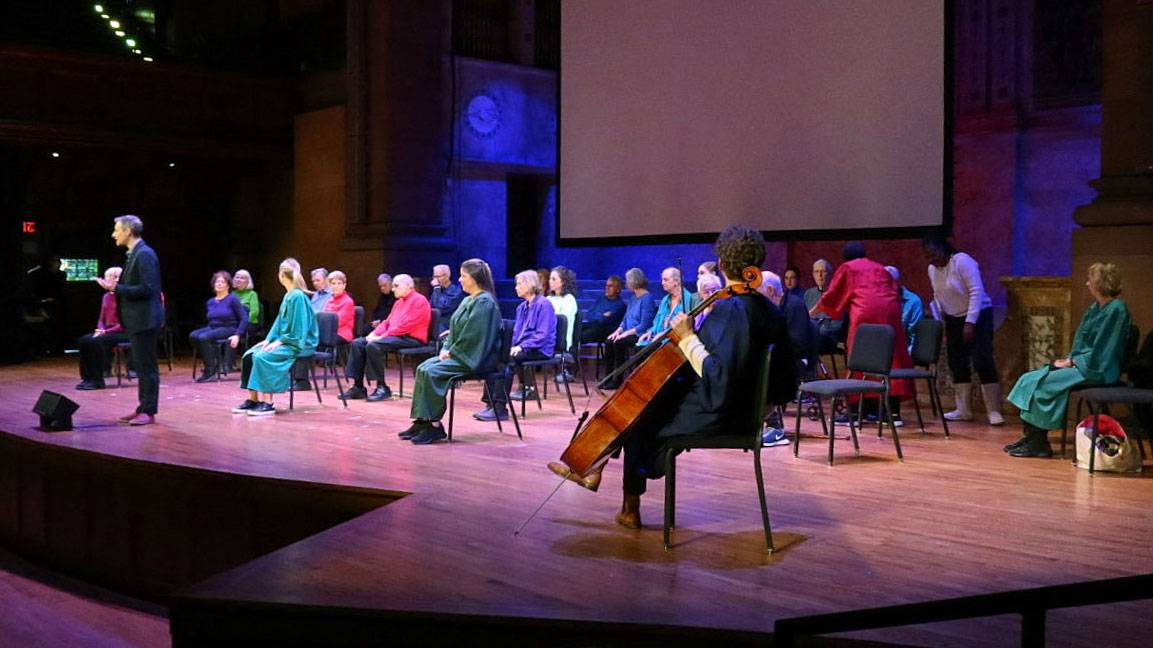
At a recent Healing with Music event, cellist Joshua Roman (foreground) accompanies a performance by adults with Parkinson’s Disease who participate in a dance class at American Repertory Ballet’s Princeton studio as part of the Mark Morris Dance Group’s Dance for PD® initiative.
Healing with Music, which she co-created with PUC marketing and outreach manager Dasha Koltunyuk, a 2015 Princeton graduate, brings in musical artists from classical and other genres to talk about how music has helped see them through difficult times and personal challenges.
A Healing with Music event earlier this month featured cellist Joshua Roman accompanying a performance of Mark Morris choreography by adults with Parkinson’s Disease who participate in a dance class at American Repertory Ballet’s Princeton studio as part of the Morris Dance Group’s Dance for PD® initiative.
Violinist Alexi Kenney has visited in conversation with broadcaster and podcaster Clemency Burton-Hill, also a violinist, who spoke about her recovery from a massive brain aneurysm. Roman has also joined Burton-Hill in a Healing with Music event focused on the role that music has played in his struggles with long COVID.
The April 24 event with Biss is the last Healing with Music performance for this season. The 2024-25 season will include events featuring Syrian composer and clarinetist Kinan Azmeh and Syrian-Armenian visual artist Kevork Mourad, the internationally renowned pianist Igor Levit, and Iranian musician Kayhan Kalhor, who will play the kamancheh (an Iranian bowed string instrument).
All Healing with Music concerts begin with a short video about the artist and their experience with illness, personal challenges and healing, and conclude with an audience Q&A. The videos are available free to the public online(Link is external). PUC also hosts a Live Music Meditation series with visiting PUC musical artists. Matt Weiner, associate dean in the Office of Religious Life, leads guided meditations accompanied by live music.
Healing with Music audience members are also invited to share stories of music’s restorative role in their own lives, either handwritten on a postcard or submitted online. PUC shares the responses with the artists and archives them in an online library(Link is external).
Biss told Seltzer one of the reasons he accepted her invitation for the April 24 Healing with Music event focused on “Unquiet” was because he had read many of those postcards online and was moved by them.
He said he also has a message for anyone struggling with anxiety.
“Don’t hide away from the thing that gives you discomfort, the feelings that are scary, which we have an instinct to push away. It’s not helpful in cultivating your personhood, your artistry if you are an artist, your individuality. One of the big tasks of life is coming to terms with your place in the world and with the reality of who you are, and how you fit into society. Even if it’s uncomfortable — maybe especially if it’s uncomfortable — it’s useful.”
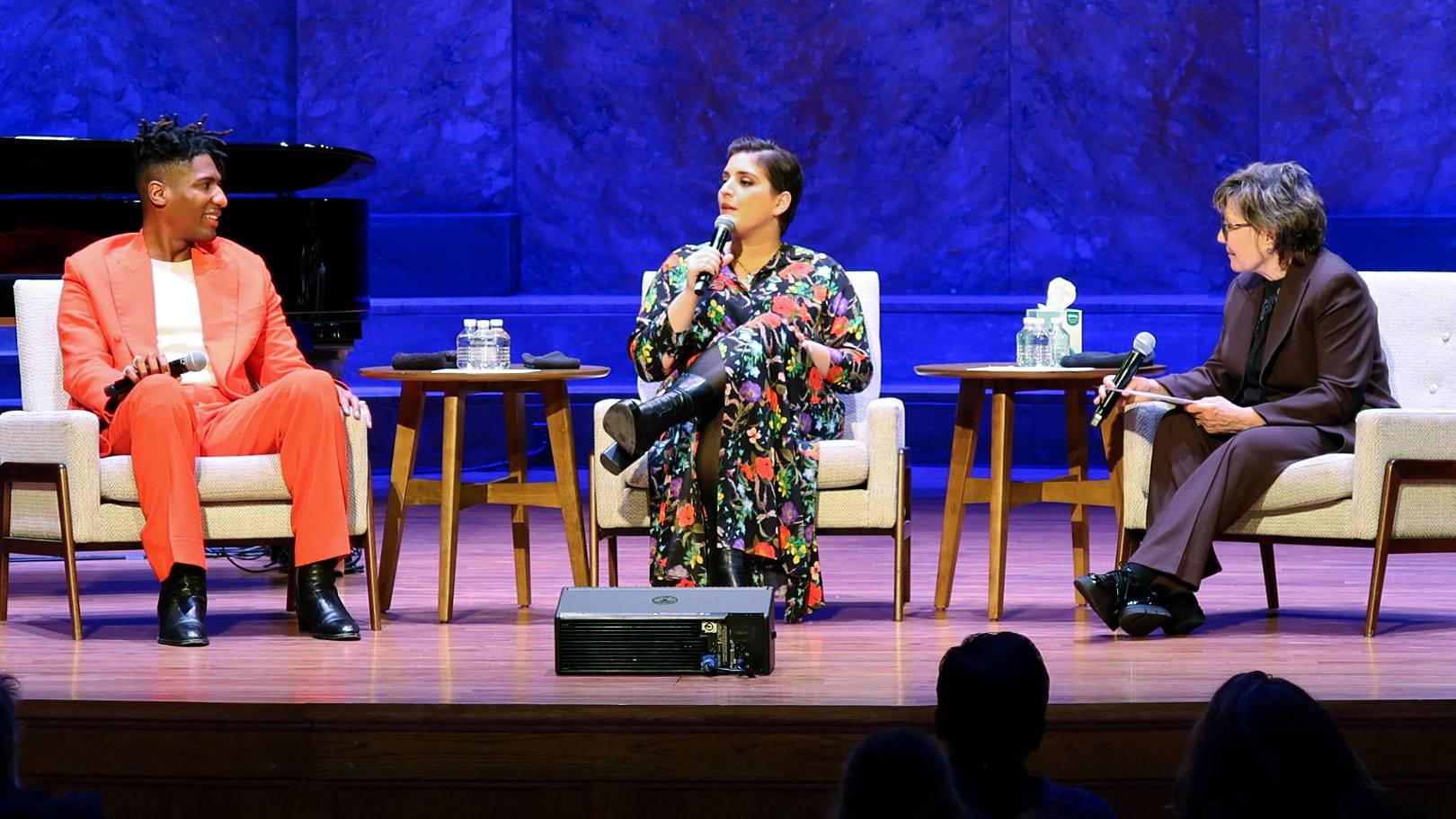
Deborah Amos (right), a Ferris Professor of Journalism in Residence at Princeton, moderates a conversation during last fall’s “Healing from Cancer Through Music” event with musician Jon Batiste (far left) and his wife, the author Suleika Jaouad, Class of 2010.
A ‘transcendent conversation’
Deborah Amos, a Ferris Professor of Journalism in Residence at Princeton and longtime international correspondent, has signed on to host the full 2024-25 Healing with Music season after serving as moderator last fall for a “Healing from Cancer Through Music” conversation with musician Jon Batiste and his wife Suleika Jaouad, a 2010 Princeton graduate who chronicled her cancer journey in The New York Times column “Life, Interrupted,” and her memoir, ”Between Two Kingdoms(Link is external).”
“In 35 years of interviewing this was the most transcendent conversation I’ve ever had,” Amos said.
Backstage before the event, Batiste had asked Amos to name her favorite composer. She said Leonard Cohen and told Batiste her favorite Cohen song was “Hallelujah,” which had been the the favorite song of her husband, journalist Rick Davis, who died in 2019.
As the onstage conversation drew to a close, Batiste announced he wanted to do a sing-along. He sat down at the piano and began to play Cohen’s ’“Hallelujah.” “The audience stood up and started to sing. It was magical,” Amos said. “He played more songs: ‘Let It Be,’ ‘You Are My Sunshine,’ ‘When the Saints Go Marching In.’ The audience belted out the words to every one of them — a remarkable thundering end to the healing power of music.”
